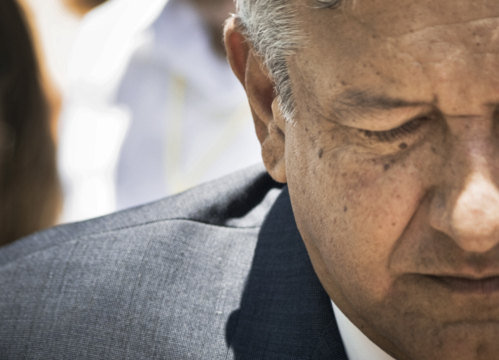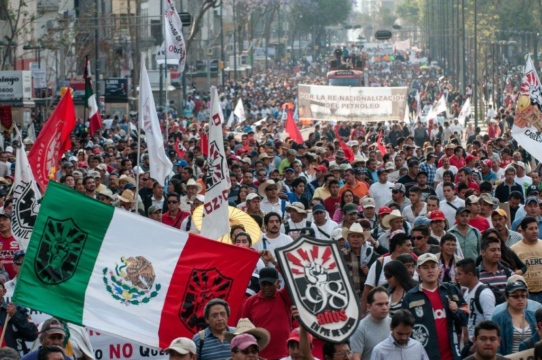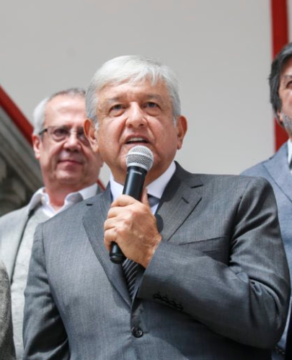This post is also available in:
Spanish
As expected, it was a landslide. Andrés Manuel López Obrador (AMLO) will become President of Mexico on December 1st after being elected with a historic 53 percent of the vote. His coalition won control over both houses of Congress, a first since Mexico’s transition to democracy in 2000. The new president is hardly a newcomer, having won on his third attempt. The utter failure of governments from PRI and PAN –the two traditional parties– to take Mexico out of its pit of violence, poverty, corruption and economic stagnation seems to have made AMLO the worst option– except for all the others.
As the first president who does not belong to PRI or PAN in nearly a century, Lopez Obrador will take office with a strong mandate to transform Mexico. The nature of that change is still uncertain, as Mexico’s new president is hard to classify: he is described as a leftist but built an alliance with a hard-right evangelical party; he is accused of being a populist, but governed Mexico City from 2000 to 2005 with pragmatism and good relations with the private sector; he claims to represent a new start but welcomed deserters from PAN and PRI into his coalition as well as union leaders accused of corruption. Similarly, AMLO spooked the country’s business sector by accusing them of being part of the “mafia of power” and promising to scrap a multibillion-dollar project for a new airport in Mexico City, only to meet Mexico’s top businessmen in early June to mend fences.
A seasoned politician who appears to have learned from past mistakes, during the campaign López Obrador used this ambiguity to broaden his coalition, deflect criticism and embody Mexicans’ demands for change without tying himself to specific policy proposals. He applied the same method to the selection of his future cabinet, which he announced months ago: it includes respected academics and centrist former public officials, together with some hardline ideologues. Soon, however, this deliberate vagueness will have to be replaced by concrete policies to meet the enormous expectations his election has raised in Mexico.
As indicated by López Obrador’s victory speech at Mexico’s Zocalo, the new government will probably combine centrist policies with anti-establishment signals directed at AMLO’s heterogeneous political base. Public spending on infrastructure and social policy will increase and the role of the state as a market regulator will be strengthened, but the new administration will “not act arbitrarily nor there will be any confiscation or expropriation,” as the president-elect noted. The future finance secretary also confirmed that the new government supports closing a deal on NAFTA as soon as possible, as well as joining the Trans-Pacific Partnership.
Further, despite his public opposition to the energy reforms passed in 2013 and his pledge to strengthen state-owned Pemex, AMLO promised to respect lawful contracts that gave oil projects to private corporations. Finally, the new president has promised a broader strategy against violence, including tackling the inequality and lack of opportunities that allowed drug cartels to take hold in large parts of the country.
Relations with the United States were not a main issue on the campaign, and AMLO promised “friendship and cooperation” with Washington, largely a continuation of the pragmatic strategy followed by the outgoing administration of Enrique Peña Nieto. López Obrador struck this moderate tone during a call with US President Donald Trump only hours after his electoral victory, which both sides described as positive and friendly. There is little room for anything else: more than 80 percent of Mexico’s exports go to its northern neighbor and there will be no solution to the country’s rampant violence without tackling US demand for drugs and supply of weapons. The tone of US-Mexico relations going forward will depend on Trump’s whims (as all US foreign policy does), but there are reasons to be moderately optimistic: Trump seems to prefer strong leaders to technocrats, and the nationalist AMLO has the domestic credibility to reach agreements with the US, unlike Peña Nieto.
Lopez Obrador will soon find out that presidents don’t get a clean slate, as Peña Nieto did after taking office amid great expectations nearly six years ago. His greatest foe will be Mexico itself. The Mexican state is corrupt, inefficient and weak. The economy is growing at an anemic pace, GDP per capita has been stagnant for years, and more than 40 percent of the population is poor. Although the country has a world-class industrial sector, factories located in the north don’t generate enough wealth to reach the broader population or destitute regions in the south. Moreover, no matter what the central government does, the roots of corruption, human rights violations and violence lie at state and local governments and their security forces, which have strong ties with gangs and drug-traffickers, as shown by the disappearance of 43 students in the state of Guerrero in 2014. Untangling those nefarious networks between criminals and public officials will take much more than a presidential term.
López Obrador’s presidency will be judged by his ability to tackle the myriad problems that beset his country while showing that change is possible within the rule of law and democratic institutions. The clock starts ticking on December 1.






















